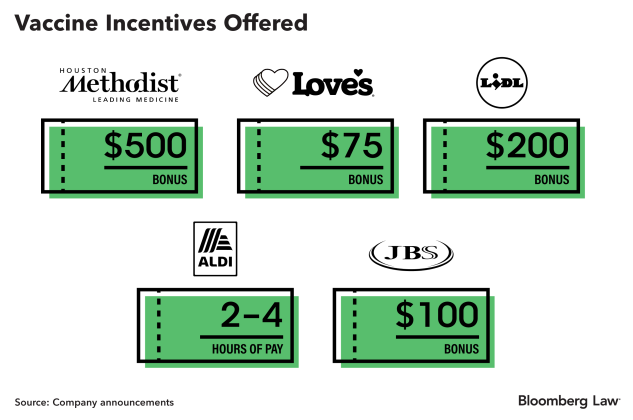According to the Centers for Disease Control and Prevention, “immunization with a safe and effective Covid-19 vaccine is a critical component of the United States strategy to reduce COVID-19 related illnesses, hospitalizations, and deaths and to help restore societal functioning.”
The CDC’s efforts to promote the vaccine have been admirable considering the supply channel challenges. Its “Vaccinate with Confidence” strategy offers six ways to help build Covid-19 confidence.
However, the CDC’s strategy has not, by itself, driven employees to get vaccinated, and some employers are turning to incentives.
Employer Incentives Grow in Popularity
In a recent report by Perceptyx based upon a survey of more than 1,000 workers, 56% would get the vaccine if encouraged to do so by their employer. Of those surveyed, 60% would get the vaccine if their employers offered a monetary incentive of $100 to do so.
Consistent with the survey results, a number of employers have moved forward with incentive offers to encourage employees to get vaccinated. Those incentives include offers of paid time off and bonus payments ranging from $75 to $500.
In a Feb. 1, letter, a number of business groups asked EEOC Chair Charlotte Burrows “to quickly issue guidance clarifying the extent to which employers may offer employees incentives to vaccinate without running afoul of the Americans With Disabilities Act and other laws enforced by the EEOC.”
The letter further stated, “Employer-provided incentives can assist governments in quickly and efficiently distributing vaccines. Legal uncertainty about providing such incentives however has many employers concerned over liability and has made them hesitant to act. We, therefore urge the EEOC to issue guidance providing clarification on the extent to which employers may offer their employees incentives to vaccinate. To ensure the guidance is as effective and efficient as possible, we also encourage the EEOC to define what qualifies as a permissible incentive as broadly as possible.”
Specific Guidance Is Lacking
To date, the EEOC has not provided any additional guidance, nor has it identified a date by which it will do so. However, on Jan. 7, the EEOC provided proposed Wellness Rules for review to address what level of incentives employers may lawfully offer to encourage employee participation in wellness programs.
These proposed rules could go into effect at early as March. The proposed rules will allow for “de minimis” incentives (e.g. water bottle or gift card of modest value) to encourage employee participation in wellness programs and for now, can reasonably be interpreted as the EEOC’s current view with respect to vaccination incentives.
Absent additional guidance from the EEOC, employers considering offering incentives to employees to get vaccinated will have to consider incentives that arguably are de minimis in nature.
In addition to the de minimis incentive issue, employers offering incentives may also open themselves up to claims of discrimination from employees exempted from vaccines. For example, an employee with a disability that precludes receipt of the vaccine and thus, denied the incentive could argue that he/she is being discriminated against because of a disability.
Under these proposed rules, employers have two options to consider for offering incentives to employees to get vaccinated and the difference between the two options is premised on the employer’s aversion to risk. For those employers with high levels of risk aversion, offering de mimimis incentives both eliminates the argument that the value of the incentive is coercive and thus illegal and discourages arguments that the incentive is a form of discrimination. However, such incentives are less likely to incentivize employees to get vaccinated.
For those employers with lower levels of risk aversion, offering paid time off and bonus payments will more likely incentivize employees to get vaccinated while, at the same time, putting these employers at risk of claims that the incentives were both too coercive and discriminatory.
As a result of the practical and legal issues associated with both options, employers are faced with the necessity of accepting one of two equally objectionable alternatives to incentivize employees to get vaccinated.
This column does not necessarily reflect the opinion of The Bureau of National Affairs, Inc. or its owners.
Write for Us: Author Guidelines
Author Information
R. Anthony “Tony” Prather is a partner at Barnes & Thornburg LLP in Indianapolis and represents management interests exclusively in virtually all aspects of labor and employment law and litigation. He served as counsel for the EEOC and has also worked in-house.
"difficult" - Google News
March 04, 2021 at 04:07PM
https://ift.tt/3e5xMlb
Employer Covid-19 Vaccine Incentives—A Difficult Dilemma - Bloomberg Law
"difficult" - Google News
https://ift.tt/2VWzYBO
https://ift.tt/3d5eskc
Bagikan Berita Ini















0 Response to "Employer Covid-19 Vaccine Incentives—A Difficult Dilemma - Bloomberg Law"
Post a Comment